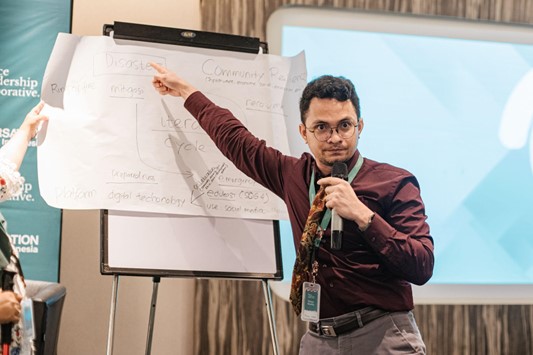Dr. Dipl. -Ing. Nuraziz Handika, S.T., M.T., M.Sc., a young lecturer at the Faculty of Engineering, Universitas Indonesia (FTUI) became part of 27 Indonesian researchers who successfully graduated from the Science Leadership Collaborative (SLC), which is a world-class scientist leadership development program. In this program, there are two selected young lecturers at the Universitas Indonesia (UI). They are lecturers from the Faculty of Engineering (FT), Dr. Dipl. -Ing. Nuraziz Handika, S.T., M.T., M.Sc., and lecturer at the Faculty of Administrative Sciences (FIA), Krisna Puji Rahmayanti, S.I.A., M.P.A., Ph.D. Their graduation was confirmed on Friday (17/03), in Ungasan, Bali.
SLC is a capacity-building program designed by The Conversation Indonesia together with several leading experts from America, Europe and Asia to develop Indonesian researchers to become future science leaders. This program will be held for the first time in 2022/2023 and is designed based on studies conducted in 2021. The participants in this activity are early-to-mid-career researchers from universities, research institutions, non-governmental organizations (NGOs), and start-ups with various knowledge and expertise.
This training activity begins with self-leading, leading the system, to innovation sprints. Immunity to Change is an interesting part before entering the Innovation Project Sprint because participants are not only explored for their potential but also explored things that hinder them from developing. Furthermore, in the Innovation Project Sprint section, participants are asked to raise problems related to research and find solutions through various innovative ideas.
For 9 months, the participants underwent an intensive program in the form of seminars and workshops, mentoring, 1-on-1 coaching, peer learning, and learning through machine learning systems to explore their potential and capacity as science leaders. Dr. Aziz graduated after developing the “How to Preserve Human’s Life and to Assure Safety & Performance of Earthquake-Resistant Building in A Ring of Fire Country (Indonesia)?” project, while Krisna completed the research themed “Increasing Community Resilience Collaboratively in Pacitan Regency”.
According to Dr. Aziz, the innovation he produced was inspired by field survey activities on simple 1-2-storey buildings (housing) after the Lombok 2018, Palu 2018, and Cianjur 2022 earthquakes. At that time, he and a team from the Structural and Materials Laboratory of the FTUI Civil Engineering Department saw the damage in simple buildings. The term non-engineered or non-engineered is a category of this type of building. From the results of the survey, it was concluded that the damage that occurred could be avoided if you followed the standards for making simple houses issued by the Ministry of PUPR or the guidelines made by a retired FTUI Civil Engineering lecturer, (late) Teddy Boen.
“Technically, the documents exist. It’s just that, maybe most of us don’t find it. In DKI Jakarta, it is required to issue a Building Permit (IMB), and there are also instructions for making these simple buildings. Meanwhile, for buildings with 8 floors and above, we are aware that there are special standards for earthquake-resistant buildings,” said Dr. Aziz.
He hopes this innovation can increase public awareness, especially when building houses. The builders (contractors and builders) as well as homeowners must be aware of the good condition of the building. By referring to the standard research results, it is hoped that the loss of life that may occur as a result of the earthquake can be reduced. In addition, collaboration with other fields, be it communication, psychology, and so on, is also needed to make it easier to convey messages to the public.
Dean of FTUI, Prof. Dr. Heri Hermansyah, ST., M.Eng., IPU expressed his pride for Dr. Nuraziz, “FTUI’s young lecturers are now shining more and more in implementing the Tri Darma of Higher Education. By participating in this program, it is hoped that Dr. Nuraziz Handika can become a leader in the field of science and technology in the future. Hopefully the Science Collaborative Leadership (SLC) program can be triggering the birth of more leadership programs for researchers in Indonesia.”
Meanwhile, Krisna believes that collaboration in this activity can be seen from the interaction between researchers and coaches and mentors from various countries. He with Prof. Deden Rukmana, Indonesian diaspora and Chair of the Department of Community and Regional Planning at Alabama A&M University, compiled research related to public participation in post-disaster housing reconstruction. This idea has been conveyed to several stakeholders, namely community representatives and government agencies in the Pacitan District.
“I hope there will be a continuation of this program and more young Indonesian researchers will be involved to broaden their horizons and collaborate with researchers from multidisciplinary disciplines. The experience during this activity has become a provision to become a researcher who is not only in the ivory tower, but can also produce research that has an impact,” said Krisna.
Chairman of the Indonesian Academy of Sciences (2008–2018) who was one of the panellists at the event, Prof. Sangkot Marzuki, and UI Professor, Prof. Jatna Supriatna also appreciated this achievement. In the inaugural graduation speech of the researchers, Prof. Jatna said that this generation was a pioneer. He hopes that the graduates will not only be able to collaborate but also become mature scientists.
***
Bureau of Public Communications
Faculty of Engineering, Universitas Indonesia

